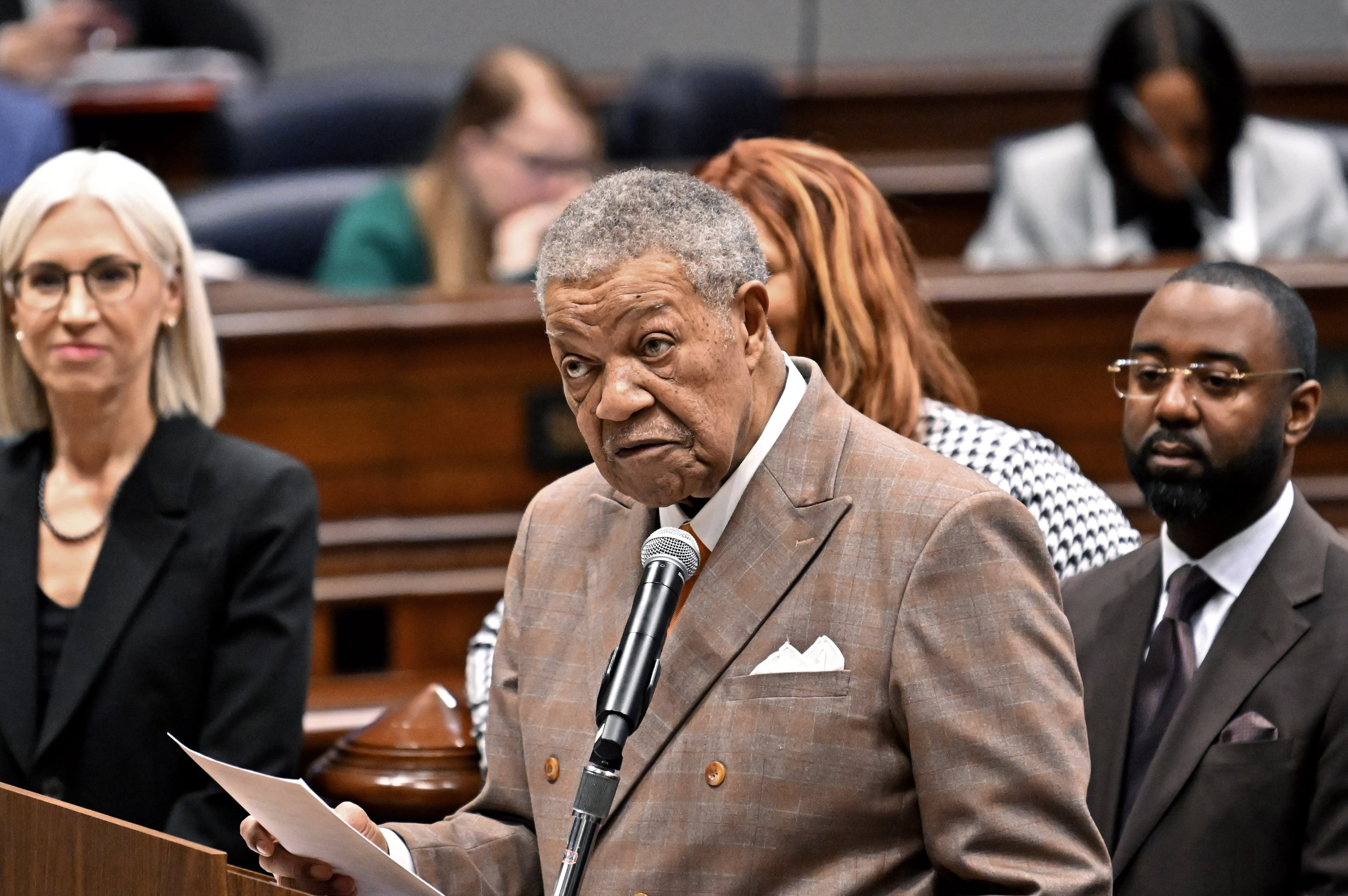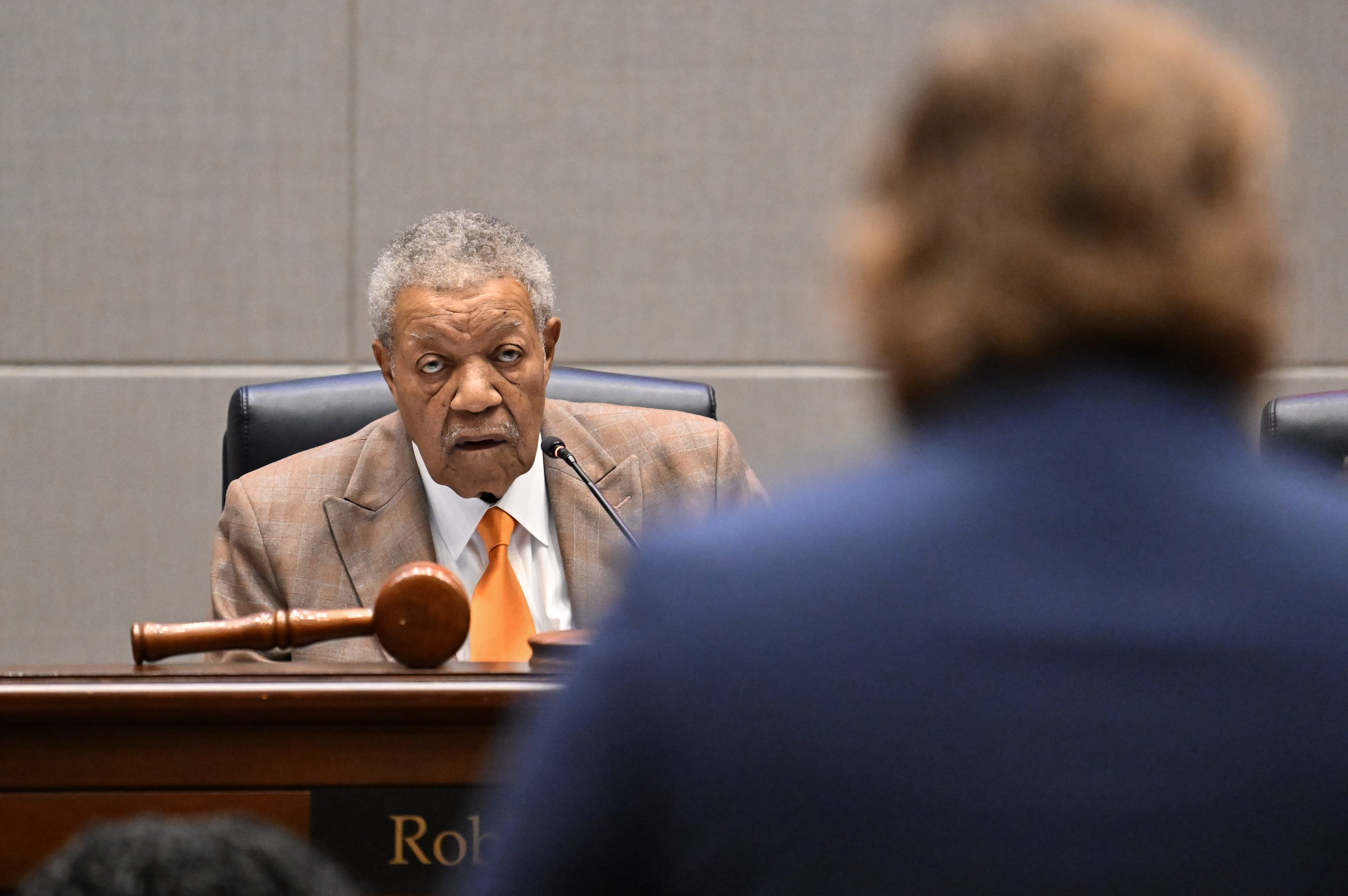Florida, once again, could play lead role in deciding election

On a sun-splotched Saturday morning, Diana Pappas is lugging a fistful of Donald Trump signs. The other two she put in front of her Cocoa Beach home were swiped in the dead of night, she lamented, and this time she was ready to put a trap on them. Maybe a snare.
It was a year of political hallmarks for Pappas. The first time volunteering for a campaign. The first time attending a political rally. And the first (and second and third) time putting a sign for a candidate in her front yard.
“I’m not giving up,” she said, after enlisting to join in Trump’s campaign at a squat building a few blocks off the beach. “There are a lot of closet Trump supporters out there, and we just need to mobilize them. This is the year we flip back.”
Trump needs a surge of political newcomers to capture Florida’s 29 Electoral College votes and salvage a dwindling chance to win the White House. Barring a monumental shake-up in other battleground states, he’ll lose the race if he loses Florida. And the bombshell video that shows him bragging about forcibly groping and kissing women has only made his challenge greater.
The polls released since the video’s release show Democrat Hillary Clinton has erased a small deficit to eke out a narrow, but consistent, lead over Trump thanks largely to support from Hispanics and women. And for Trump to neutralize her advantage, he needs to shore up his support from white voters, who make up about 65 percent of the state’s electorate.
That means concentrating his campaign in the northern part of the state, particularly near the border of Georgia and Alabama, where many voters share deeply conservative values. It also means appealing to voters such as Pappas in the swing districts along the I-4 corridor, where rural north Florida blends with the more urban southern part of the state.
Even some of his hard-core supporters are shaken, though.
“I really hope we can win Florida. And Trump should win Florida,” said Amber Horton, a 33-year-old home school mom in southeast Florida. “But I am skeptical.”
An uneasy Clinton courtship
Florida’s razor-thin vote in 2000 helped decide the election for George W. Bush after bitter legal battles, and the Republican held the state four years later. But Florida flipped to the blue column with Barack Obama, who won the state in 2008 and 2012 with the help of record support from Hispanic and African-American voters.
Clinton has tried to lean on the same coalition of young voters and minority supporters that Obama cobbled together, but it has been an uneasy courtship.
Black voters, who make up 13 percent of the state’s voter base, gave her tepid support in polls earlier in the year. So did Hispanics, who account for more than 15 percent of the electorate, amid concerns about her support for repealing the Cuban trade embargo, which remains wildly popular with Cuban-Americans in south Florida.
The tide seems to be shifting, though. Trump’s hard-line stance on immigration has done him few favors with the Hispanic community. Nor has a report that showed a Trump-owned casino paid a consultant in 1998 to seek business opportunities with Cuba despite the embargo. One recent poll showed Clinton with a 30-point edge over Trump among Hispanic voters.
Roxie Muir, a retiree from Port St. Lucie who is black, said she’s seen the shift in her community as African-American voters worry that Trump will undo many of Obama’s accomplishments.
“She is offering what the other side isn’t — sanity and safety. We will have neither if the opposition wins,” Muir said. “He has already gone beyond the pale. There is no such thing as worse than worst. He’s at rock bottom.”
Republicans came into the contest with some key advantages. They’ve narrowed a voter registration gap with Democrats to just about 274,000, and they built a network of dozens of field offices and thousands of volunteers across the state.
Trump has also effectively tapped into unrest from disillusioned voters, many who live in the deeply conservative Panhandle and upper-class beachside towns. Bill Sekscenski, a southeast Florida retiree, marveled at the thousands who flocked to a Trump rally in nearby Melbourne who shared his disgust with Washington politics.
“People are ready for change,” he said. “It’s hard to argue — there’s an awful lot of support for him.”
Trump’s backyard
Florida’s gilded coast is also a hometown of sorts for Trump, who owns a home in the ritzy Palm Beach area. Monica Soricelli lives there, too, and she sees a bitter class divide in play. Neighbors in upscale parts of town are voting in lockstep for Trump, she said, while her friends in working-class neighborhoods are siding with Clinton.
“We have a lot of people who just aren’t ready for a woman in the White House,” Soricelli said. “And look who she is not doing well with — angry white men.”
But polls show she’s also struggling with college-educated white women, including Sonia Pappadapoulos. The Satellite Beach resident has largely avoided getting involved in politics, but she’s more frustrated than ever over what she calls Obama’s false promises of hope and change. This election, she said, will be a turning point in American history.
“People are finally awakening to the fact that the Dems have done zero for them. They need to recognize that they are being fooled by Dems,” Pappadapoulos said. “I just don’t see that peoples’ lives are any better than they were eight years ago.”
She welcomes the internal civil war engulfing the GOP as pro-Trump loyalists attack Republicans who have abandoned him after his crude comments about women.
“If there’s one thing I’ve learned about this contest, if you’re good to Donald, he’s good,” Pappadapoulos said. “If you’re bad to him, you’re dead to him. And I kind of live by the same motto. And the gloves are about to come off.”
‘We might be surprised’
Trump’s all-out war with his own party and with Clinton unnerves her supporters, too.
Eileen Riordan sported a homemade “I’m With Her” shirt the other day as she walked around downtown Port St. Lucie, and she laughed as she talked about Trump’s latest campaign troubles. But when asked about Clinton’s chances in Florida, a look of concern washed across her face.
“If she wins here, she’ll win the race. But she needs our help — I’m really worried about it,” Riordan said. “She just doesn’t have the same support Obama had. She’s not as likable. And the trust factor is hurting her.”
Maureen Quinn shares the same worry. She’s a veteran nurse who lives in south Florida and spends many weekends canvassing neighborhoods to register undecided voters. Quinn has a deep knowledge of Florida’s changing demographics and seems to have memorized the latest batch of polls showing Clinton with a narrow lead.
But she’s seen enough elections in Florida to know that three weeks might as well be three years in Sunshine State politics.
“It’s going to be a really, really close race here. Trump has divided this state so badly,” she said. “We might be surprised by Florida — again.”
Shifting South
This is the seventh and final installment of a weekly series by The Atlanta Journal-Constitution on the political currents that define our region. Today’s story, by Greg Bluestein, probes the presidential race in Florida ahead of the November election.
21 days until vote
Tuesday marks 21 days until Americans vote in federal and state races on Nov. 8. All year, The Atlanta Journal-Constitution has brought you the key moments in those races, and it will continue to cover the campaign’s main events, examine the issues and analyze candidates’ finance reports until the last ballot is counted. You can follow the developments on the AJC’s politics page at https://www.ajc.com/politics/ and in the Political Insider blog at https://www.ajc.com/politics/politics-blog/. You can also track our coverage on Twitter at https://twitter.com/GAPoliticsNews or Facebook at https://www.facebook.com/AJCGaPolitics.
Shifting South: Explore the series
Why the South is anything but solid for either Clinton or Trump
Why Alabama is Trump’s red-state constant
Changing demographics drive Virginia’s purple reboot
In South Carolina, Democrats enjoy ever brief moment of parity
Florida, once again, could play lead role in deciding election
Our Shifting South stories: Full coverage
Florida
Electoral votes: 29
Population*
20,271,272
Population change since 2010: 7.8 percent
*Estimated, July 1, 2015
Race and Hispanic origin
Non-Hispanic white: 55.3 percent
Black: 16.8 percent
Hispanic: 24.5 percent
Education**
High school diploma or higher: 86.5 percent
Bachelor’s degree or higher: 26.8
** For people 25 or older
Economy
Real median household income, 2014: $46,140
Per-capita income, 2015: $44,101
Unemployment rate, July: 4.7 percent
Poverty rate: 16.5 percent
Congressional delegation
U.S. Sen. Bill Nelson, Democrat, took office in 2001
U.S. Sen. Marco Rubio, Republican, took office in 2011
U.S. Rep. Gus Bilirakis, Republican, took office in 2013
U.S. Rep. Corrine Brown, Democrat, took office in 2013
U.S. Rep. Vern Buchanan, Republican, took office in 2013
U.S. Rep. Kathy Castor, Democrat, took office in 2013
U.S. Rep. Curtis Clawson, Republican, took office in 2014
U.S. Rep. Ander Crenshaw, Republican, took office in 2001
U.S. Rep. Carlos Curbelo, Republican, took office in 2015
U.S. Rep. Ron DeSantis, Republican, took office in 2013
U.S. Rep. Theodore Deutch, Democrat, took office in 2013
U.S. Rep. Mario Diaz-Balart, Republican, took office in 2013
U.S. Rep. Lois Frankel, Democrat, took office in 2013
U.S. Rep. Gwen Graham, Democrat, took office in 2015
U.S. Rep. Alan Grayson, Democrat, took office in 2013
U.S. Rep. Alcee Hastings, Democrat, took office in 2013
U.S. Rep. David Jolly, Republican, took office in 2014
U.S. Rep. John Mica, Republican, took office in 1993
U.S. Rep. Jeff Miller, Republican, took office 2001
U.S. Rep. Patrick Murphy, Democrat, took office in 2013
U.S. Rep. Richard Nugent, Republican, took office in 2013
U.S. Rep. Bill Posey, Republican, took office in 2013
U.S. Rep. Thomas Rooney, Republican, took office in 2013
U.S. Rep. Ileana Ros-Lehtinen, Republican, took office in 2013
U.S. Rep. Dennis Ross, Republican, took office in 2013
U.S. Rep. Debbie Wasserman Schultz, Democrat, took office in 2013
U.S. Rep. Daniel Webster, Republican, took office in 2013
U.S. Rep. Frederica Wilson, Democrat, took office in 2013
U.S. Rep. Ted Yoho, Republican, took office in 2013
Governor
Rick Scott, Republican, took office in 2011
Four of Florida past seven governors, going back to 1979, have been Republicans.
State Legislature
Republicans control both chambers of the state Legislature.
Recent presidential voting history
2012
Barack Obama, Democrat: 50.0 percent
Mitt Romney, Republican: 49.1 percent
2008
Barack Obama, Democrat: 51.0 percent
John McCain, Republican: 48.2 percent
2004
George W. Bush, Republican: 52.1 percent
John Kerry, Democrat: 47.1 percent
2000
George W. Bush, Republican: 48.8 percent
Al Gore, Democrat: 48.8 percent
1996
Bill Clinton, Democrat: 48.0 percent
Robert Dole, Republican: 42.3 percent
2016 presidential primary
Democratic winner: Hillary Clinton, 64.4 percent
Republican winner: Donald Trump, 45.7 percent
Sources: U.S. Census Bureau, Federal Reserve, govtrack.us, www.nga.org, Ballotpedia, 270towin.com



